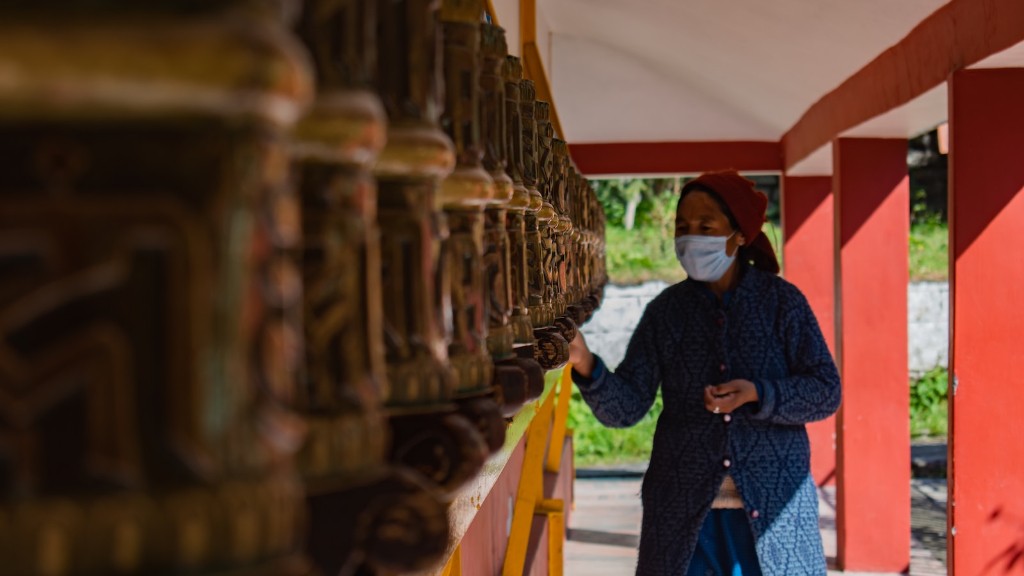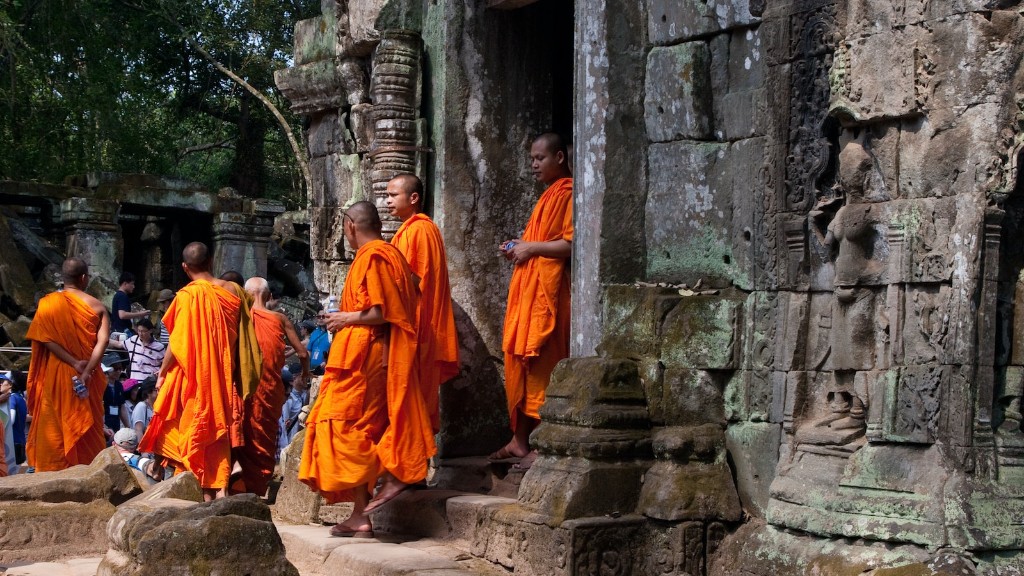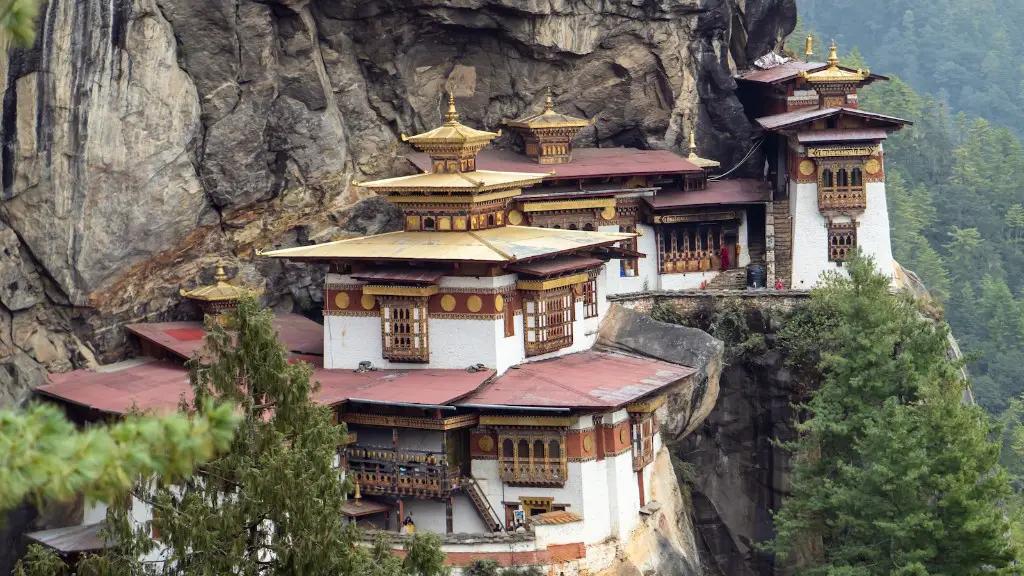Buddhism is a religion that is based on the belief in reincarnation. This means that after we die, our soul is reborn into another body. There are many different beliefs about what happens when we die, but Buddhists believe that it is a continuous cycle.
In Buddhism, there is no single answer to what happens when we die. The Buddha taught that it is not possible to know what happens after death, because it is beyond our realm of experience. However, he did offer some guidance on how to live our lives in a way that may lead to a positive rebirth.
What happens after someone dies in Buddhism?
Buddhists believe that death is a natural part of the life cycle. They believe that death simply leads to rebirth. This belief in reincarnation – that a person’s spirit remains close by and seeks out a new body and new life – is a comforting and important principle.
Tibetan Buddhists believe that there is an in-between stage known as the bardo which can take up to 49 days. This is the time between death and rebirth where the soul is in a limbo state. Theravada Buddhists believe that rebirth can be immediate. Those who attain enlightenment (nirvana/nibbana) do not get reborn upon their death and instead reach a state of complete peace.
Where do you go after death in Buddhism
The idea of rebirth is central to Buddhism, and it is one of the key things that sets it apart from other religions. For most Buddhists, the belief about where you go when you die is not that you go somewhere else, but rather that you are reborn as something and someone completely different. This is known as the cycle of rebirth, and it is a key part of the Buddhist understanding of the world.
In Buddhism, there is no concept of punishment or reward and there is no divine being who decides who goes to hell or heaven. There is merely the illusory results of our thought, words and deeds, which we call karma.
What is the Buddhist belief 49 days after death?
The Buddhist mourning period is a time of great importance. Many traditions believe that this is the time when rebirth occurs, and that the prayers of the living can help guide the deceased into the next life. For this reason, Buddhists often observe a mourning period of 49 days, during which they say prayers for the deceased every seven days.
It is believed in Buddhist cultures that a good death is one in which the individual is conscious and aware of what is happening to them. The last moments of life can affect the nature of rebirth. The more calm and prepared a person is the better their rebirth is considered to be.
How many times can you reincarnate Buddhism?
The Sotāpanna is considered to be the first stage of liberation from the cycle of rebirths. Although they still have up to seven rebirths left, they are assured of eventually reaching Nirvana. The Sakadāgāmi is the second stage of liberation and will only return for one more human rebirth. The Anāgāmi is the third and final stage of liberation, and will only return once more to a heavenly realm.
It is difficult to lose someone we love and it can be even more difficult when we don’t know what to expect. Death is the end of life but it doesn’t have to be the end of our relationship with the person we love. Grieving is a process that helps us to cope with our loss and to still feel connected to the person we loved even though they are no longer with us.
How to deal with death Buddhism
In Buddhist traditions, death is seen as a natural process that happens to everyone. Buddhists believe in reincarnation, so they see death as a way for a person to move on to their next life. Because of this, Buddhists don’t usually mourn the death of a loved one in the same way that other cultures do. Instead, they focus on celebrating the person’s life and giving them gifts to help them in their journey to the next life.
There are some high level Buddhists that have drawn analogies between Jesus and Buddhism. The Dalai Lama stated in 2001 that “Jesus Christ also lived previous lives”, and added that “So, you see, he reached a high state, either as a Bodhisattva, or an enlightened person, through Buddhist practice or something like that”. Thich
What is the significance of 13 days after death?
Pind Sammelan is a very important ritual in Hinduism, and is performed on the 13th day after somebody has died. It is believed that this ritual helps to place the departed soul with the ancestors and God. This is a very big day for the family and friends of the deceased, and everyone works together to make sure that the ritual is performed correctly.
The 40th day after death is a significant day in both Islam and the Eastern Orthodox tradition. On this day, the dead are believed to be interceding on behalf of the living, and awaiting the Day of Judgment. In Islamic tradition, it is believed that the 40th day is when the soul is reunited with the body, and in the Eastern Orthodox tradition, it is believed that the 40th day is when the soul enters into Paradise or Hades. In both traditions, this day is seen as a time of transition and a time to reflect on the life of the deceased.
What do Buddhists do 100 days after death
The 100th day is a significant milestone in many cultures. On this day, people celebrate the successful passage of their loved ones into the afterlife. Families can choose to include prayers and offerings in honor of their loved ones, and later they may enjoy foods that were loved by the person who died. This ceremony is a beautiful way to honor the memory of a loved one.
There are a few things to keep in mind when it comes to end-of-life care for Buddhists. First and foremost, Buddhists believe in the sanctity of life and the interdependence of all beings. Therefore, they would typically want to avoid any actions that would cause harm to another being. This includes things like lying, killing, and stealing. Additionally, Buddhists would want to focus on practicing ethically good speech and actions, as well as showing kindness and compassion for all beings.
Are Buddhists scared of death?
Buddhist theory instructs the individual to cope with death anxiety and cultivate acceptance through training the mind to detach from personal conceptions and expectations of death and to see the impermanent nature of life. This can be done through practices such as meditation, which help the individual to develop a greater sense of awareness and detachment from the material world. In addition, it is important to remember that death is a natural part of life and is not something to be feared. By accepting death, we can let go of our attachment to the things of this world and focus on what is truly important.
The disagreement between Eastern and Western religious beliefs about the soul’s eternal life is a long-standing debate. Christianity and Islam both teach that the soul is eternal, while Buddhism believes that everything is impermanent, including the self. This debate is likely to continue for many years to come, as both sides have strong arguments to support their respective beliefs.
Do humans have souls in Buddhism
There is no soul or self in the sense of a permanent, intrinsic, autonomous “I” inhabiting our bodies according to the historical Buddha. We are all soulless alike.
Anatta is a central concept in Buddhism that refers to the lack of a permanent, underlying self or substance in humans. This means that the individual is constantly changing and is not defined by any one thing. This can be a difficult concept to wrap your head around, but it is an important part of the Buddhist teachings.
Final Words
In Buddhism, it is believed that when we die our consciousness is reborn into another body. This is known as reincarnation and is a key concept in Buddhist teaching. It is believed that through reincarnation we can eventually achieve Nirvana, which is a state of perfect peace and freedom from suffering.
There is no conclusive answer to what happens when we die according to Buddhism. Different schools of Buddhism have different beliefs about what happens to a person’s soul after death and whether or not there is reincarnation. Some believe in a form of rebirth where the soul is reborn into another person or animal, while others believe that the soul is extinguished and does not carry on after death. What happens after death is still largely unknown and is a mystery to us all.



